新概念英语第一册Lesson 70
新概念英语(1)Lesson70_80

新概念(1)级 lesson70---80测试题家长意见:分数:一.根据汉语意思来补全单词。
1.5.m_d_c_ne 药6.sm_l_微笑7.gr_ _t问候8.cr_ _d 人群8.h_ _sew_rk 家务 9. gr_c_r 杂货店 10. Sh_pp_ing 购物二.用恰当的介词来填空。
1.They were _________the stationer's _______September 9th.2. I was ________Beijing ___________2007.3. He is going to the library _________Monday .4. The old man is sitting __________the right .5. What's wrong __________the fashionable shoes ?6. Two cats are running __________the wall.7. I always get up _________half past six every day .8. My father was in England __________1996.9. My mother bought a pair of shoes ________me .10. I got this lovely handbag ____________US.三.用括号里词的正确形式填空。
1.He __________(telephone) me four times last week.2.I __________(answer) his phone yesterday evening .3.My boss ________(go) to the park every day .4.The children are ________(play) a game in the park now.5.She is going to ________(call) the doctor in the afternoon.6.John always drives his car _________(quick).7.The old man walked _________(slow).8.They ________(go) to Canada last year .9.My family ________(watch) TV last night.10.She ________(sweep) the floor every day .四.从以下各组词语中选择与其他不同类的一组。
裕兴新概念英语第一册笔记:Lesson 70 When were they there
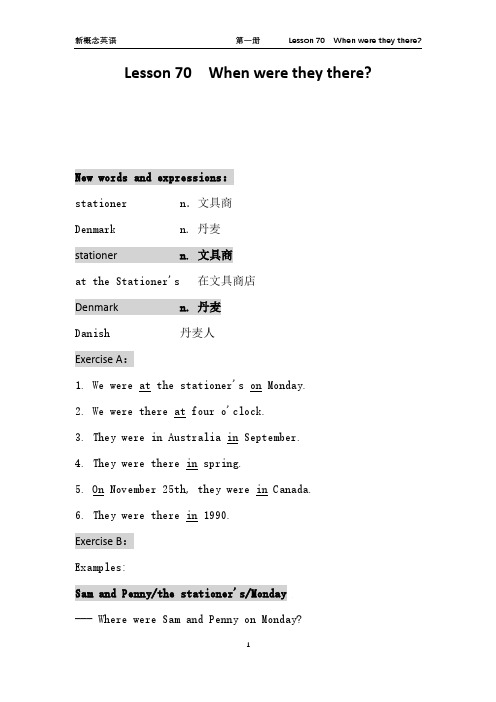
Lesson 70 When were they there?New words and expressions:stationer n.文具商Denmark n. 丹麦stationer n. 文具商at the Stationer's 在文具商店Denmark n. 丹麦Danish 丹麦人Exercise A:1. We were at the stationer's on Monday.2. We were there at four o'clock.3. They were in Australia in September.4. They were there in spring.5. On November 25th, they were in Canada.6. They were there in 1990.Exercise B:Examples:Sam and Penny/the stationer's/Monday--- Where were Sam and Penny on Monday?--- They were at the stationer's on Monday. you and Penny/Australia/July--- Where were you and Penny in July?--- We were in Australia in July.1. you and Susan/the office /Hatch 23rd--- Where were you and Susan on March 23rd? --- We were at the office on March 23rd.2. Sam and Penny/India/1986--- Where were Sam and Penny in 1986?--- They were in India in 1986.3. you and Penny/the baker's /Saturday--- Where were you and Penny on Saturday?--- We were at the baker's on Saturday,4. Sam and Penny/Canada/1993--- Where were Sam and Penny in 1993?--- They were in Canada in 1993.5. you and Penny/Austria/August--- Where were you and Penny in August?--- We were in Austria in August.6. Sam and Penny/home/Hay 25th--- Where were Sam and Penny on Hay 25th?--- They were at home on Hay 25th.7. you and Penny/Finland/December--- Where were you and Penny in December?--- We were in Finland in December.8. you and Sam/school/February 22nd--- Where were you and Sam on February 22nd?--- We were at school on February 22nd.小结--- 介词:in 用在月份、年、国名前面at 用在时间、钟点、具体位置或方位的名词前on 用在具体日期、星期前Listening --- <Stepmom>Anna: I didn't say that. Why would I say that you and daddy are getting back together?Jackie: Sometimes people make up stories about things that they wish would happen.Anna: I don't want that to happen. Why would I want that to happen?我没那样讲,我为什么要说你和爸爸和好了。
新概念课堂笔记第一册Lesson69-70
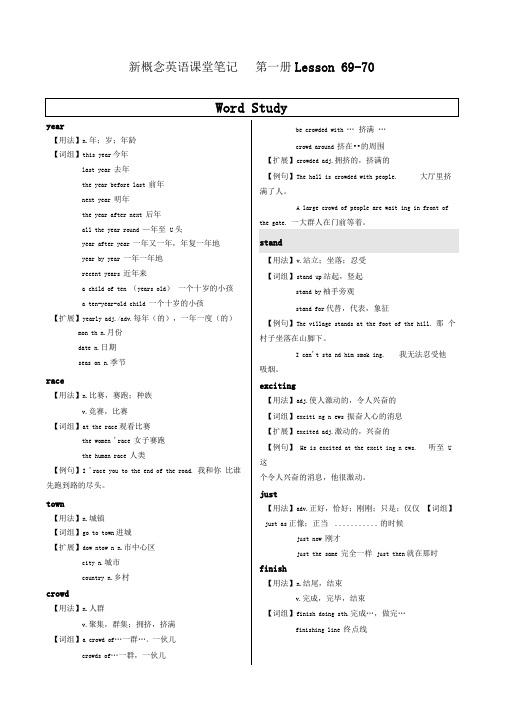
新概念英语课堂笔记第一册Lesson 69-70year【用法】n.年;岁;年龄【词组】this year今年last year 去年the year before last 前年next year 明年the year after next 后年all the year round —年至U头year after year 一年又一年,年复一年地year by year 一年一年地recent years 近年来a child of ten (years old)一个十岁的小孩a ten-year-old child 一个十岁的小孩【扩展】yearly adj./adv.每年(的),一年一度(的)mon th n.月份date n.日期seas on n.季节race【用法】n.比赛,赛跑;种族v.竞赛,比赛【词组】at the race观看比赛the women 'race 女子赛跑the human race 人类【例句】I 'race you to the end of the road. 我和你比谁先跑到路的尽头。
town【用法】n.城镇【词组】go to town进城【扩展】dow ntow n n.市中心区city n.城市country n.乡村crowd【用法】n.人群v.聚集,群集;拥挤,挤满【词组】a crowd of…一群…,一伙儿crowds of…一群,一伙儿be crowded with … 挤满…crowd around 挤在••的周围【扩展】crowded adj.拥挤的,挤满的【例句】The hall is crowded with people. 大厅里挤满了人。
A large crowd of people are wait ing in front of the gate. 一大群人在门前等着。
【用法】v.站立;坐落;忍受【词组】stand up站起,竖起stand by袖手旁观stand for代替,代表,象征【例句】The village stands at the foot of the hill. 那个村子坐落在山脚下。
新概念英语第一册Lesson69-70一般过去时练习

【宏博教育】新概念英语第一册一般过去时小练习一、改写下面的句子1. There were about nine hundred people at the concert.否定句:__________________________________________一般疑问句:________________________________________对划线部分提问:____________________________________2. Ann did her homework yesterday evening.否定句:__________________________________________一般疑问句:________________________________________对划线部分提问:____________________________________3. My brother was in the park just now.否定句:__________________________________________一般疑问句:________________________________________对划线部分提问:____________________________________4. I am a teacher.一般过去时:___________________________________ 3 years ago.一般疑问句:____________________________________________5. She is at school today.一般过去时:___________________________________ yesterday.一般疑问句:____________________________________________对划线部分提问:_________________________________________now.6. I am at the butcher’s一般过去时:___________________________________ last week.否定形式:______________________________________________一般疑问句:____________________________________________对划线部分提问:_________________________________________7. They buy a lot of pineapples.一般过去时:__________________________________ this morning.一般疑问句:____________________________________________对划线部分提问:_________________________________________ 8. The shoes are in fashion now.一般过去时:____________________________________ last year. 一般疑问句:____________________________________________二、改错题(请改正每个句子中的一个错误)1. How is Jane yesterday? ______________________________2. I can fly kites seven years ago. _________________________3. Tom wasn't watch TV last night. ________________________4. I did not my homework yesterday. _______________________。
新概念英语第一册 lesson 70精美课件
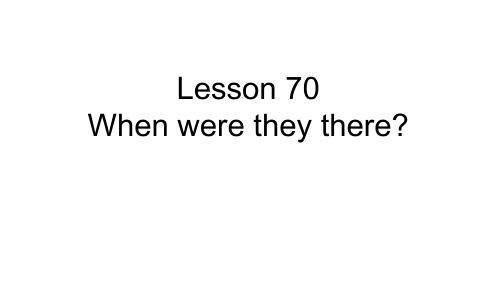
对“地点”的提问?
• Where be sb +时间? • in the classroom
where
• I am in the classroom .
Just have a try !
• I'm at home on weekends. • My parents are in the office on every Moday. • I was at home on last weekends.
主语+was/ were/ v(e)d+yesterday/ just now • 否定句:
主语+ wasn’t/ weren’t/ didn’t +V(原形) • 一般疑问句:was/ were+ S+ …?
Did +主语+V原+ …? • 回答:Yes, S+ was/ were/ did.
No, S+ wasn’t/weren’t /didn’t
a book on the bookshelf.
yesterday
There ___w_e_r_e ( are were )
some books on the bookshelf.
There be
一般现在时
单:There is a/ an … 复:There are some …
一般过去时
单:There was a/an … 复:There were some …
-- Were you at school
yesterday ?
-- Yes, I was.
-- Were you at the office
last night ?
新概念英语第一册第69-70课

Words
year
race town
exciting
stand
finish crowd
words
winner just
way
behind
(1) year: n. ① 年。
this year 今年 last year 去年
next year 明年 every year 每年
No, there wasn’t.
It’s time to watch.
There is a car race
汽车比赛
near our town every year.
每年 (1)a horse race 赛马 a 10-mile race 10英里赛跑 a boat race 划船赛跑 注:当race表示比赛时,是可数名词,前面要 加不定冠词“a”。
the year before last 前年
the year after next 后年
(1) year: n. ②岁数。
基数词 + year (s) + old e.g. My friend’s mother’s 40 years old.
How old are you? I’m 11 years old.
It was an exciting finish.
(1)在以元音发音开头的单词前, 要用不定冠词an。 an exciting race 一场激动人心的比赛 an exciting film 一部激动人心的电影 (2)it: 指代the car race。
The winner was Billy Stewart.
介词 at
1、用介词at的时间短语通常表示: 确切的时间、具体时刻(at 10 o’clock 10点整) 用餐时间(at lunchtime 午餐时间)
新概念英语第一册课后题及答案Lesson69-70
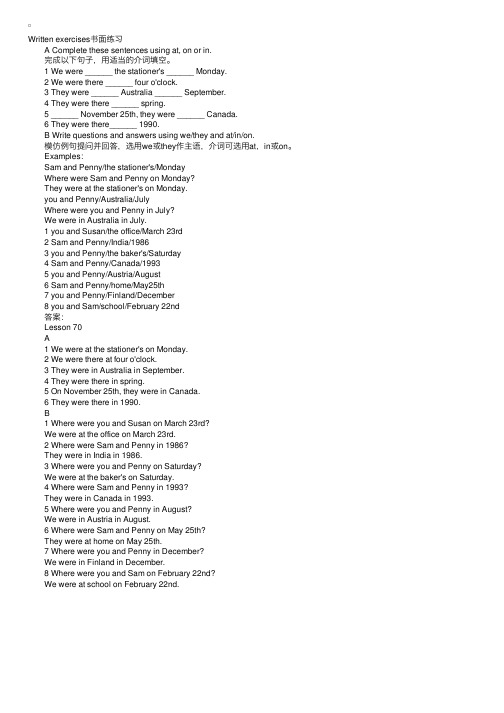
Written exercises书⾯练习 A Complete these sentences using at, on or in. 完成以下句⼦,⽤适当的介词填空。
1 We were ______ the stationer's ______ Monday. 2 We were there ______ four o'clock. 3 They were ______ Australia ______ September. 4 They were there ______ spring. 5 ______ November 25th, they were ______ Canada. 6 They were there______ 1990. B Write questions and answers using we/they and at/in/on. 模仿例句提问并回答,选⽤we或they作主语,介词可选⽤at,in或on。
Examples: Sam and Penny/the stationer's/Monday Where were Sam and Penny on Monday? They were at the stationer's on Monday. you and Penny/Australia/July Where were you and Penny in July? We were in Australia in July. 1 you and Susan/the office/March 23rd 2 Sam and Penny/India/1986 3 you and Penny/the baker's/Saturday 4 Sam and Penny/Canada/1993 5 you and Penny/Austria/August 6 Sam and Penny/home/May25th 7 you and Penny/Finland/December 8 you and Sam/school/February 22nd 答案: Lesson 70 A 1 We were at the stationer's on Monday. 2 We were there at four o'clock. 3 They were in Australia in September. 4 They were there in spring. 5 On November 25th, they were in Canada. 6 They were there in 1990. B 1 Where were you and Susan on March 23rd? We were at the office on March 23rd. 2 Where were Sam and Penny in 1986? They were in India in 1986. 3 Where were you and Penny on Saturday? We were at the baker's on Saturday. 4 Where were Sam and Penny in 1993? They were in Canada in 1993. 5 Where were you and Penny in August? We were in Austria in August. 6 Where were Sam and Penny on May 25th? They were at home on May 25th. 7 Where were you and Penny in December? We were in Finland in December. 8 Where were you and Sam on February 22nd? We were at school on February 22nd.。
Lesson70Whenweretheythere_(课件)新概念英语第一册

Thank you!
对地点提问: Where were you? We were in the dairy.
对时间提问: When were you in the dairy? We were there on Saturday.
对地点提问: Where were they? They were at home.
对时间提问: When were they at home? They were there at home.
Where were you ________?
A on Sunday. B in Sunday C at Sunday D Sunday
Grammar
at home on May 25th. at the park on January 21st.
at home on May 25th. at the park on January 21st.
对地点提问: Where were they? They were in the park.
对时间提问: When were they in the park? They were there on January 21st.
对地点提问: Where were you ? We were in Canada.
Where were _________? They/We were in/at ___________________. When _________ there? They /We were___________________.
Where were _________? They/We were in/at ___________________. When _________ there? They /We were___________________.
新概念英语第一册Lesson65~70课后答案
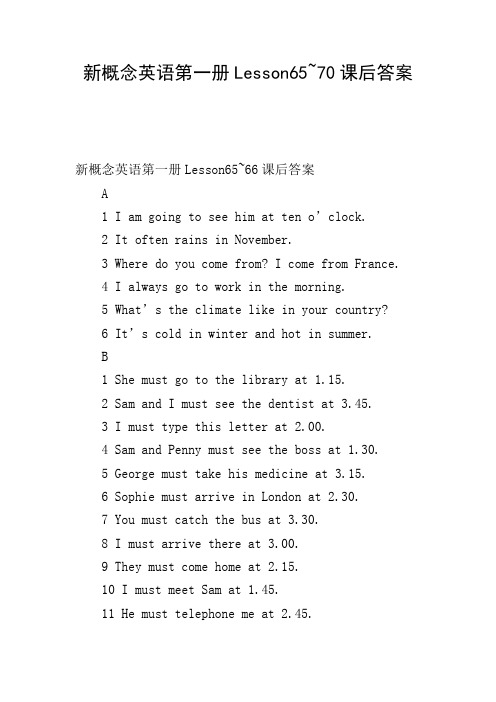
新概念英语第一册Lesson65~70课后答案新概念英语第一册Lesson65~66课后答案A1 I am going to see him at ten o’clock.2 It often rains in November.3 Where do you come from? I come from France.4 I always go to work in the morning.5 What’s the climate like in your country?6 It’s cold in winter and hot in summer.B1 She must go to the library at 1.15.2 Sam and I must see the dentist at 3.45.3 I must type this letter at 2.00.4 Sam and Penny must see the boss at 1.30.5 George must take his medicine at 3.15.6 Sophie must arrive in London at 2.30.7 You must catch the bus at 3.30.8 I must arrive there at 3.00.9 They must come home at 2.15.10 I must meet Sam at 1.45.11 He must telephone me at 2.45.新概念英语第一册Lesson67~68课后答案A1 I was at church on Sunday.2 I was at the office on Monday.3 My son was at school on Tuesday.4 My wife was at the butcher’s on Wednesday.5 She was at the grocer’s on Thursday.6 My daughter was in the country on Friday.7 I was at home on Saturday.B1 When was Tom at the hairdresser’s? He was at the hairdresser’s on Thursday.2 When was Mrs. Jones at the butcher’s? She was at the butcher’s on Wednesday.3 When was he at home? He was at home on Sunday.4 When was Penny at the baker’s? She was at the baker’s on Friday.5 When was Mrs. Williams at the grocer’s? She was at the grocer’s on Monday.6 When was Nicola at the office? She was at the office on Tuesday.新概念英语第一册Lesson69~70课后答案A1 We were at the stationer’s on Monday.2 We were there at four o’clock.3 They were in Australia in September.4 They were there in spring.5 On November 25th, they were in Canada.6 They were there in 1990.B1 Where were you and Susan on March 23rd? We were at the office on March 23rd.2 Where were Sam and Penny in 1986?They were in India in 1986.3 Where were you and Penny on Saturday? We were at the baker’s on Saturday.4 Where were Sam and Penny in 1993?They were in Canada in 1993.5 Where were you and Penny in August?We were in Austria in August.6 Where were Sam and Penny on May 25th? They were at home on May 25th.7 Where were you and Penny in December? We were in Finland in December.8 Where were you and Sam on February 22nd? We were at school on February 22nd.。
新概念英语第一册Lesson71-76课后答案

新概念英语第一册Lesson71~76课后答案新概念英语第一册Lesson71~72课后答案A1 It is raining now. It rained yesterday.2 It is snowing now. It snowed yesterday.3 He is boiling some eggs. He boiled some yesterday.4 We are enjoying our lunch. We enjoyed it yesterday, too.B1 What did they do yesterday? They cleaned their shoes yesterday.2 What did he do last night? He opened the box last night.3 What did they do this morning? They sharpened their pencils this morning.4 What did she do this evening? She turned on the television this evening.5 What did she do last night? She listened to the radio last night.6 What did she do yesterday morning? She boiled an egg yesterday morning.7 What did they do yesterday afternoon? They playeda game yesterday afternoon.8 What did he do in the morning the day before yesterday? He stayed in bed in the morning the day before yesterday.9 What did she do yesterday evening? She telephoned her husband yesterday evening.10 What did she do the night before last? She called the doctor the night before last.新概念英语第一册Lesson73~74课后答案A1 He read the phrase slowly.2 He worked lazily.3 He cut himself badly.4 He worked carefully.5 The door opened suddenly.B1 He does not know me very well.2 She worked very hard.3 She smiled pleasantly.4 The bus went hurriedly.5 He shaved slowly.6 She drank a glass of water thirstily.7 He greeted me warmly.8 We enjoyed ourselves very much.新概念英语第一册Lesson75~76课后答案A1 She met her friends yesterday.2 They drank some milk yesterday.3 He swam in the river yesterday.4 She took him to school yesterday.5 He cut himself yesterday.B1 When did you walk across the park? I walked across the park last week.2 When did you wash your hands? I washed my handsa minute ago.3 When did you work in an office? I worked in an office the year before last.4 When did you ask a question? I asked a question five minutes ago.5 When did you type those letters? I typed those letters a month ago.6 When did you watch television? I watched television every day this week.7 When did you talk to the shop assistant? I talked to the shop assistant last month.8 When did you thank your father? I thanked myfather an hour ago.9 When did you dust the cupboard? I dusted the cupboard three days ago.10 When did you paint that bookcase? I painted that bookcase the year before last.11 When did you want a car like that one? I wanteda car like that one a year ago.12 When did you greet her? I greeted her a minute ago.。
新概念英语第一册课后练习题答案:Lesson 70
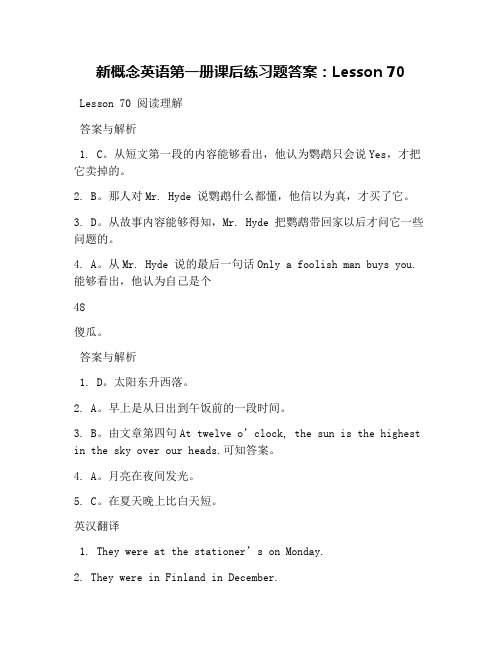
新概念英语第一册课后练习题答案:Lesson 70Lesson 70 阅读理解答案与解析1. C。
从短文第一段的内容能够看出,他认为鹦鹉只会说Yes,才把它卖掉的。
2. B。
那人对Mr. Hyde 说鹦鹉什么都懂,他信以为真,才买了它。
3. D。
从故事内容能够得知,Mr. Hyde 把鹦鹉带回家以后才问它一些问题的。
4. A。
从Mr. Hyde 说的最后一句话Only a foolish man buys you.能够看出,他认为自己是个48傻瓜。
答案与解析1. D。
太阳东升西落。
2. A。
早上是从日出到午饭前的一段时间。
3. B。
由文章第四句At twelve o’clock, the sun is the highest in the sky over our heads.可知答案。
4. A。
月亮在夜间发光。
5. C。
在夏天晚上比白天短。
英汉翻译1. They were at the stationer’s on Monday.2. They were in Finland in December.3. What are you going to do in America?4. Have you ever been to America?5. Father was in London last Monday.6. She was in the North in August this year.7. Where are you going to travel this year?8. They were in India in 2005.。
新概念英语第1册课程讲义Lesson69-70

Lesson 69 单词讲解1. year: 年1998 年:in 19982013 年:in 2013蛇年:the year of the snake今年:this year去年:last year今年是蛇年,去年龙年。
It is the year of the snakeand it was the year of the dragon.2. race: 比赛比速度- 汽车比赛、划船比赛、赛跑a car race, a boat race, a running race球类比赛:matcha football match, a basketball match…3. town: 城镇village- town- city4. crowd: 人群in the crowda crowd of people5. stand: 站立6. exciting: 令人激动的The football match is exciting.7. just8. finish: 完成、结尾v.I must finish it on time.n.= endIt is a good finish(end) of the movie.9. winner: 获胜者win- winnerthe first10. behind: 后面in front of : 前面11. way: 路途A. on the way…在去学校的路上:on the way to school在回家的路上:on the way homeB. No way!C. By the way,…Lesson 69 课文讲解1. There were hundreds of people there.hundred: 百one hundredtwo hundred…hundreds of… : 成百上千的thousands of…:上千上万的millions of…:不计其数的2. My wife and I were at the race.You and I…She\ he and I…Lucy, you and Iat the race: 在比赛现场3. There were twenty cars in the race.in the race: 参加比赛4. He was in car number 15.15 号车: car number 15(car 15)10 号线: Line 10601 室: Room 60119 站台: Platform 19…5. 其他5 辆车?other five carsfive other cars其他两位老师:two other teachers6. On the way home…7. My wife said to me, “…”.is-wasam-wasare-weresay-saidLesson 69 语法讲解There be 句型的过去式1. 构成:There be+ (was, were)+地点奥运会时北京的老外特别的多。
Lesson69-Lesson70(课件)新概念英语第一册

Lesson 69
Lesson 69 The car race
There is a car race
汽车比赛
near our town every year. 每年
a horse race 赛马 a 10-mile race 10英里赛跑
every day/ week/ Monday…
In 1995,
Italy
America
Japan
He was in car number fifteen.
在第15号车里
On the way home, my wife said
to me…
在回家的路上
Lesson 69/ Class Two/ Page 137…
finish line
It w..a..s an e.x.c..i.ti.n..g. finish.
be 动词口诀
肯定变否定,be后要把 not添, 肯定变疑问,遵循以下四个点, 1找、2提、3抄、4要变。
be
be
其它内容
。→ ?
TWhaesrethweraes a big car rraace inin1919955. ?
TYehse,rtehweraes wnoats.a big car Nroa,cteheinre19w9a5s.n’t.
Italy
America
Japan
• Australia • Austria • Canada • Denmark • Finland • Poland • Thailand
• India • Turkey • Japan • Korea • France • Germany • Nigeria
Denmark电话);回答 最后的,前一次的 电话(=telephone) 又一次地 说
新概念英语第一册lesson69-70 PPT课件
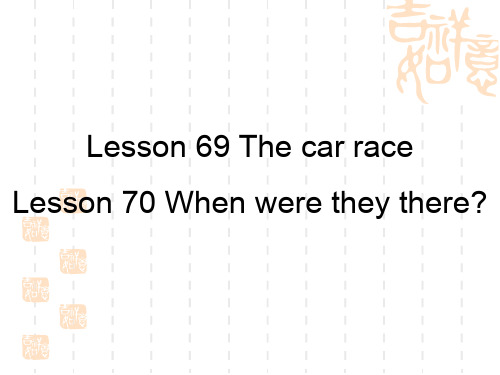
give gave Tom gives me a bag . Tom gave me a bag yesterday . Tom did not give me a bag yesterday .
Tom didn’t give me a bag yesterday . Did Tom give you a bag yesterday ?
Penny and me were at school on February 2nd. Sam and Tom were in India in 1990.
on in
at
on
in
in
to
at
on in
He didn’t say to me. Did he say to you?
there, too. You can see us in the crowd. We are
standing on the left. There were twenty cars in
the race. There were English cars, French cars,
German cars, Italian cars, American cars and
行为动词的过去式有规则变化和不规则变化两种,规 则变化有以下几种情况:
(1)直接在动词原形末尾加-ed. work-----worked; ask------asked; ( 2)以e结尾的动词只加-d. arrive-----arrived; like-----liked. (3)末尾只有一个辅音字母的重读闭音节,应先双写
口诀:"动词变成过去式,双写规律要牢记;y前 若是辅音字,y变i加-ed;y前若是元音字,只须 直接加-ed.""一般过去时态里,过去形式莫忘 记".
新概念英语第一册lesson69-70
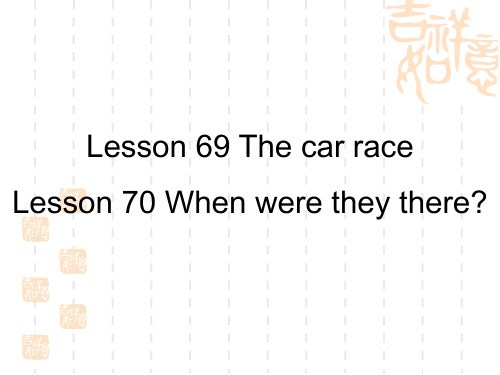
▪ Who was the winner?
▪ Billy Stewart.
race /reis/ n. 比赛
▪ n. 种类;人种 ▪ v. 比赛,竞赛 ▪ relay race 接力赛 ▪ the human race 人类
just adv.正好,恰好
▪ adv. 刚才;方才;仅仅
▪ just as 正……的时候 ▪ just now 刚刚 ▪ just the same 完全一样 ▪ just then 就在那时
▪ behind him 在他之后 ▪ just behind him 紧紧跟在他后面
▪ Five other cars are just behind him. ▪ Five other cars were just behind him. ▪ 其他五辆车紧跟在他后面。
▪
The car race
There is a car race near our town every year.
In 1995, there was a very big race. There were
hundreds of people there. My wife and I were
at the race. Our friends, Julie and Jack! You're not Billy Stewart!
一般过去时(二)
▪ There was a very big race. ▪ There was not a very big race. ▪ Was there a very big race?
- 1、下载文档前请自行甄别文档内容的完整性,平台不提供额外的编辑、内容补充、找答案等附加服务。
- 2、"仅部分预览"的文档,不可在线预览部分如存在完整性等问题,可反馈申请退款(可完整预览的文档不适用该条件!)。
- 3、如文档侵犯您的权益,请联系客服反馈,我们会尽快为您处理(人工客服工作时间:9:00-18:30)。
apparent adj.
1) 显然的,明显的 eg. It was apparent to all of us that he was lying. 对大家来说很显然他在说谎
2) 外表的,表面的 an apparent advantage表面上的优点 eg In spite of her apparent indifference, she was warm-hearted. 表面上装作漠不关 心,实际上很热心
玛丽对
玛丽的听
bullfight n. 斗牛 drunk n. 醉汉 wander v. 溜达,乱走 ring n. 圆形竞技场地 unaware adj. 不知道 的,未觉察的 bull n. 公牛 matador n. 斗牛士 remark n. 评论;言语
apparently adv. 明显地 sensitive adj. 敏 感的 criticism n. 批评 charge v. 冲上去 clumsily adv. 笨 拙地 bow v. 鞠躬 safety n. 安全地带 sympathetically adv. 同情地
Lesson 70
Directed by 40
First - Game
the rules of a game
Game rules
1.number
纸盒里有数字签, 每个人抽签并决 定分组(注意不 要上你旁边的小 朋友看到你的号 码哦~)
Game rules
2.odevity (奇偶数) 奇数一组,偶数一组
Game rules
3.score
接下来所有的内容 都有问答环节并相 应赋分,最后得分 高的一组会有 神秘 小礼物*1
Game rules
4.punish (惩罚) 为 保 证 良 好 的 课 堂 秩 序,并有一个温馨的游 戏氛围,凡是玩手机、 接话把等一系列违反课 堂纪律的个人,一经发 现,该组总分-5
【Key structure】
3. 与of连用的形容词: independent of(独立于) jealous of(妒忌) kind of/to(对……和蔼) short of(缺乏) worthy of(值得) shy of(顾虑) sure of(肯定) north/south/east/west of(在……的北/南/东/西面)
apparently adv. 明显地 sensitive adj. 敏 感的 criticism n. 批评 charge v. 冲上去 clumsily adv. 笨 拙地 bow v. 鞠躬 safety n. 安全地带 sympathetically adv. 同情地
bull n. 公牛 bully n. 恃强凌弱的人 cow n. 母牛,奶牛 coward n.懦弱者 Eg . Cowards die many times before their deaths ; the valiant never taste of death but once. 懦夫在死之前,已死 去多次;而勇士一生只死一次。(出自莎士 比亚悲剧《裘力斯·凯撒》)
【Key structure】
5. 与at连用的形容词: bad at(不善于……) clever at(擅长) efficient at(能胜任的) expert at/in(能熟练做……) good at(善于) indignant at(对……感到愤慨) quick at(很快) sad at/about(因……而悲伤) slow at(对……迟钝) skillful at/in(熟练)
aware 2) adj. (对...)意识敏锐的,有...知识的 eg. She is a politically aware woman. 她 是位政治意识敏锐的女性
1) n. 意见,评论,感想, rude remarks 粗话 2) v. (把感想、意见)说出,叙述,发言 (比say)正式
aware 1) adj. 察觉到的,知悉的 be aware of sth be aware that ...
eg. He wasn't aware of the danger. 有察觉到危险的存在
他没
eg. Are you aware that you are sitting on my hat ? 你意识到你坐在我的帽子上了吗?
2) v.(指人、思想)走神,胡思乱想 eg. His mind is wandering.他心不在焉 eg. She wanders in her conversation.她的谈 话杂乱无章
3) . v. 迷路,迷途(常与off连用) eg. The climbers wandered off in the mountains. 那些登山者在山里迷路了 4) v.(谈话)脱离正题,离题 eg. He wandered off the subject. 他说着说着
Grammar
key structure
【Key structure】
1.与for连用的形容词: eager for (渴望) enough for (足够) famous for (以……而闻名) fit for (合适) grateful for/to (因……而感激) qualified for/in (能胜任) ready for/to (准备好) responsible for (对……负责) sorry for (对……感到遗憾) sufficient for (充足的) thankful for/to (感谢) valid for (有效期为……)
wonder 想知道,惊讶,惊奇 eg. I wonder who he is. 我想知道他是谁
1) n. 圆形竞技场地 bullring 斗牛场 circus ring 马戏场
2) n. 环,环状物 a wedding ring 结婚戒指 an engagement ring 订婚戒指 ring-finger 无名指
apparent adj.
3) It is apparent + to sb +that (对...而言)明显的是 eg. It is apparent to us that he hasn't done his work properly.
eg . Mary is sensitive to smells. 味道很敏感 eg . Mary has a sensitive ear. 觉很灵敏
【Key structure】
4. 与to连用的形容词: liable to(对……有义务的) new to(对……没有经验) obedient to(对……服从) obvious to(对……清楚的) polite to(对……有礼貌) previous to(先于) harmful to(对……有害的) sensitive to(对……敏感) similar to(与……相似) indifferent to(对……不关心)
【Key structure】
6. 与from连用的形容词: away from(距……远的) different from(与……不同的) far from(远离) safe from(无危险的)
【Key structure】
7. 与in连用的形容词: deficient in (缺少) fortunate in (在……很幸运) honest in (对……很诚实) weak in (在……薄弱的)
Game rules
当然如果是这样 就不好玩了
So , Let's go
Learn New words
bullfight n. 斗牛 drunk n. 醉汉 wander v. 溜达,乱走 ring n. 圆形竞技场地 unaware adj. 不知道 的,未觉察的 bull n. 公牛ቤተ መጻሕፍቲ ባይዱmatador n. 斗牛士 remark n. 评论;言语
ox 大公牛(oxen, pl. )
calf 小牛 bull market 牛市(股市行情很好)
bear market 熊市(股市行情不好) like a red rag(破布) to a bull 令人暴怒的事情
1) n. (口) 醉酒者,醉鬼 drunkard 酒鬼 (person who often gets drunk)
2) adj. 喝醉的 (通常作表语) as drunk as a lord 酩酊大醉 3) adj. (因感动、高兴等)沉醉、陶醉的 (常作表 语) drunk with sth. 陶醉,飘飘然,忘乎所以 drunk with power
1) v. 游荡、闲逛、漫步、溜达 wanderer 漂泊者,流浪汉 eg. He wandered in as if he has nothing to do .他溜达进来好像他无事可做 eg.She was wandering up and down the road.她在马路上来来回回的溜达
【Key structure】
8. 与on连用的形容词: dependent on(依赖于……) intent on(专心于……) keen on(热心于……)
【Key structure】
9. 与about连用的形容词: curious about(对……好奇的) doubtful about/of(对……有疑问) enthusiastic about(对……热心) reluctant about/to(勉强) right about/in(在……是正确的) uneasy about(对……感到不安)
remark that eg. She remarked that it was getting warmer and warmer. 她阐述到现在天气 变得越来越热了。
remark on / remark upon 就某事物发表意 见 eg. The guests remarked on her new dress. 客人们就她的新连衣裙发表意见
